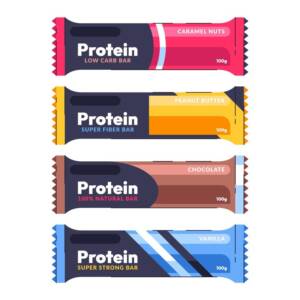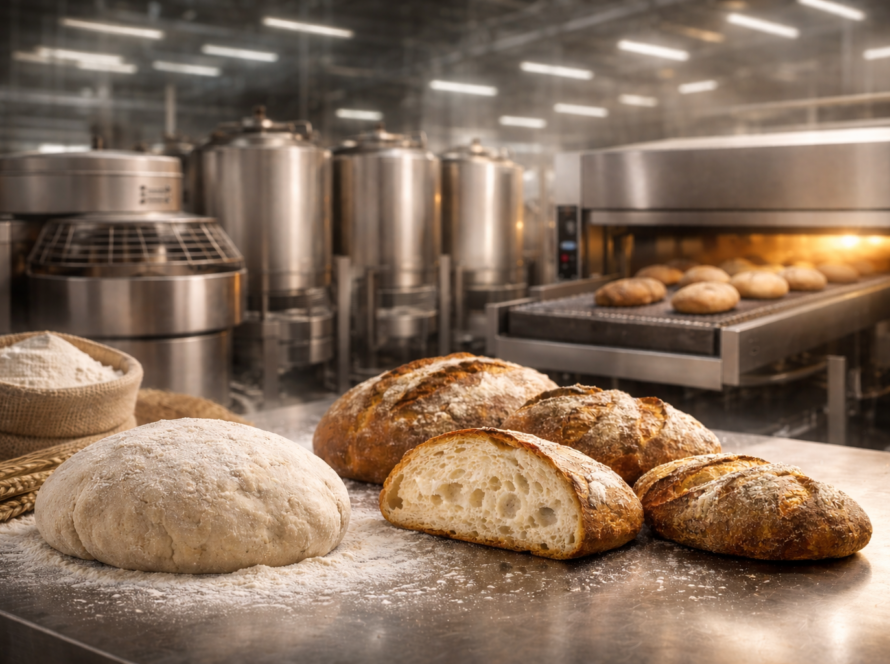
In recent years, protein bars have become one of the most popular snacks among athletes, health-conscious people, and people on special diets. The demand for this product has increased significantly due to its many benefits, such as providing a quick source of protein and energy, in addition to being a nutritious and easy-to-use option. However, making protein bars is not a simple process; it requires in-depth knowledge in the field of nutrition, modern technologies, and manufacturing innovations to ensure the quality of the final product.
In this article, we will review how protein bars are made, innovations in this field, and manufacturing methods in a protein bar factory.
What is a protein bar?
A protein bar is a type of ready-made meal that contains high levels of protein and is a suitable option for people who need to increase their protein intake quickly and easily. Protein bars usually contain a combination of proteins (such as whey protein or plant protein), carbohydrates, healthy fats, and sometimes fiber, vitamins, and minerals.
Protein bar ingredients vary depending on the brand, and flavors can range from chocolate to fruits and nuts. But the main ingredient that distinguishes protein bars is the high percentage of protein, which contributes to building muscle and improving recovery after exercise.
Protein Bar Manufacturing Process in a Protein Bar Factory
The protein bar manufacturing process in a protein bar factory includes several basic stages starting from selecting raw materials to packaging the final product. Here is an overview of these stages:
1- Selecting the basic ingredients
First, the protein bar factory must carefully select the main ingredients. These ingredients include protein (whey, soy protein, rice protein, etc.), carbohydrates (such as oats, or added sugar), fats (such as nuts or vegetable oils), and natural flavors such as vanilla and chocolate.
2- Mixing the ingredients
After selecting the ingredients, comes the stage of mixing them together to form the basic dough. In the protein bar factory, specialized industrial equipment is used to mix the ingredients homogeneously. This mixing depends on the composition of the different ingredients to obtain the ideal texture that distinguishes the protein bar.
3- Shaping and cutting
After mixing the ingredients, the dough is shaped into bars using specialized shaping machines or molds. Cutting the bars into precise sizes is an important part of the manufacturing process, as this requires accuracy in determining the dimensions to ensure that the consumer receives a uniform nutritional portion.
4- Baking or Freezing
After forming, the protein bar may be baked or frozen in some cases. Baking is used to stabilize the ingredients and give them a better taste, while freezing may be used to preserve the freshness of the ingredients and improve the shelf life. This process depends on the technology used in the protein bar factory, and it should be noted that this does not affect the nutritional value.
5- Packaging and Packing
After baking or freezing is complete, comes the packaging stage. At this stage, the protein bar is individually packaged using durable packaging materials to maintain its quality and flavor. Modern packaging techniques are used to ensure optimal preservation of the product during transportation and storage
Innovations in the Protein Bar Industry
With the increasing demand for protein bars in the market, protein bar manufacturers have started developing innovations to improve the ingredients, manufacturing method, and even the consumption experience. Here are some of the major innovations in the protein bar industry:
1- Plant-based proteins
With the increasing popularity of plant-based diets, protein bar manufacturers have started using plant-based proteins such as pea protein, rice, and quinoa. These innovations help meet the needs of vegan and lactose intolerant consumers.
2- Natural sweetening techniques
Instead of using refined sugar or artificial sweeteners, many protein bar manufacturers have started using natural sweeteners such as honey, stevia, or maple syrup. This shift helps improve the health of the product and make it a healthier option for consumers.
3- Eco-friendly packaging
Many protein bar manufacturers have come up with eco-friendly packaging solutions using biodegradable or recycled materials. These innovations help reduce the environmental impact of these products.
4- Varied flavors
Flavors have become more diverse over time. Consumers can now choose from innovative flavors such as matcha, dates, or tropical flavors such as coconut and banana. This variety makes protein bars an attractive option for consumers looking for new experiences.
Challenges in the protein bar industry
Despite the many innovations in this field, the protein bar industry faces some challenges. One of the most prominent challenges is ensuring a balance of ingredients. Protein bars must be rich in protein and other nutrients, while maintaining a pleasant flavor. Also, manufacturers must ensure food safety through quality testing and compliance with health standards.
Market Analysis and Consumer Needs in the Protein Bar Industry
In today’s world, the protein bar industry has become an essential part of the healthy food market. It is important to accurately identify consumer needs in order to develop a product that meets those needs. Studies indicate that a large segment of consumers are looking for healthy food options that can provide them with high energy and nutritious ingredients without negatively affecting their overall health. For this reason, the protein bar manufacturer focuses on providing options free of added sugar, vegan options, as well as options free of gluten and dairy products.
1- Demand for plant-based proteins
In recent years, the demand for plant-based proteins has grown significantly, prompting many companies to introduce soy protein, pea protein, or even protein extracted from grains such as rice and quinoa into their products. This trend allows protein bar manufacturers to appeal to a wider audience, including those who follow a vegan lifestyle or are allergic to animal products.
2- Demand for natural flavors
There is a growing awareness about artificial ingredients and the use of additives in foods. As a result, the demand for natural flavors and organic ingredients is on the rise. Protein bar manufacturers that focus on using organic raw materials and natural flavors are building a strong reputation in the market, and are receiving positive response from consumers who prefer healthy and natural options.
Environmental Challenges and the Protein Bar Industry
Environmental issues are important topics that protein bar manufacturers need to consider. With the growing interest in sustainability, companies need to think about how to reduce their environmental impact. For example, protein bar manufacturers should consider using biodegradable or recycled packaging materials instead of traditional plastic.
Many companies are starting to adopt a “sustainability” approach in their production plans by reducing waste and improving energy efficiency in manufacturing processes. Protein bar factories that care about reducing carbon emissions are gaining the trust of green consumers, making them stand out in the market.
How to improve the production process in a protein bar factory?
Quality in the protein bar industry depends largely on the technology used in production. Innovation in production techniques is essential to raise product quality and achieve market excellence. Some companies have started adopting modern technologies such as automation to improve the production process and ensure uniformity in the size and taste of the bars.
Quality control
Quality control is an essential step to ensure that every product manufactured in a protein bar factory adheres to the highest quality standards. This includes conducting rigorous tests on raw ingredients, as well as examining each batch of protein bar to ensure that it is free of any defects or contamination.
Modern packaging techniques
With the increasing trend towards preserving the natural ingredients in the product, modern packaging techniques have become an innovative solution to protect protein bar from environmental factors. By using airtight packaging that meets health standards, protein bar factories can maintain the nutritional value of the product throughout its storage period.
The role of research and development in the protein bar industry
In a protein bar factory, it is not just about making bars. Success in this field requires investing in research and development to design new and innovative products. The research and development team at Protein Bar Factories analyzes market trends and studies consumer needs with the aim of introducing new flavors or improving the quality and nutritional value of protein bar ingredients.
Developing new flavors
Research and development contributes to the continuous improvement of flavors, allowing manufacturers to offer new and exciting options. The research team can develop flavors that combine protein with local products such as honey and nuts to provide innovative food options.
Using new ingredients to improve nutritional value
In the quest to improve the nutritional value of products, protein bar factories use ingredients such as probiotics, soluble fiber, and essential minerals to improve the nutritional performance of the final product. These ingredients include adding elements that enhance digestion or enhance the body’s ability to absorb protein.![]()
The protein bar industry has seen a huge evolution over the past few years, thanks to continuous innovations in product ingredients, manufacturing methods, and packaging techniques. With a high-tech protein bar factory and best manufacturing practices, companies can offer a unique product that meets the needs of their audience. As health awareness increases and more people turn to healthy and nutritious foods, the protein bar industry continues to grow and flourish.
If you are looking to enter this growing market or improve your manufacturing processes, ProNano Food Industry Consulting offers you full support through specialized consultations. Feel free to contact our team to help you achieve your goals and create a protein bar factory that is in line with the latest trends in this evolving industry.
Read more about the food supplement industry




2 Comments
Gregory
Oh my goodness! Amazing article dude! Thank you so much, However I am experiencing problems with
your RSS. I don’t understand the reason why I can’t join it.
Is there anyone else having the same RSS problems?
Anyone who knows the answer can you kindly respond? Thanx!!
Rosetta
I simply could not leave your web site before suggesting
that I extremely enjoyed the usual info an individual provide for your guests?
Is gonna be again frequently to check up on new posts